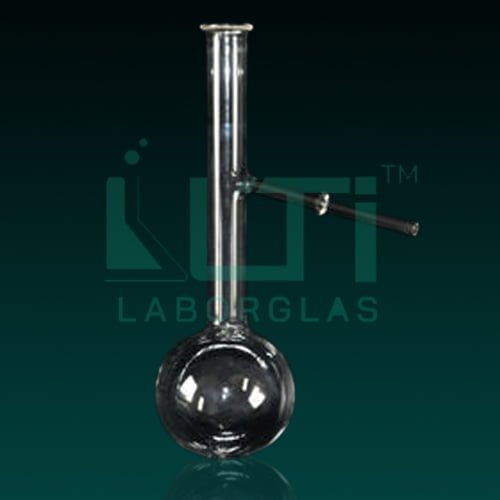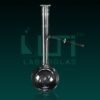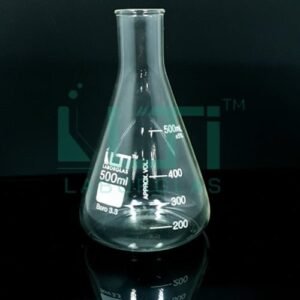- Made from ASTM E-438 Type 1, Boro 3.3 heat resistance glass
- Complies with ASTM E-133, ASTM D-86, D-233, D-801 & D 802
* Non ASTM
| PART No. | Capacity (ml) | Dia (mm) | Height (mm) | Side Dia (mm) | Arm Length | PACK Qty. |
| 5460-100* | 100 | 65 | 215 | 7 | 100 | 2 |
| 5460-125 | 125 | 68 | 215 | 7 | 100 | 2 |
| 5460-250 | 250 | 85 | 226 | 9 | 130 | 2 |
| 5460-500* | 500 | 105 | 240 | 9 | 130 | 2 |
Here are common uses of a distillation flask in accordance with ASTM standards:
- Fractional Distillation:
- The distillation flask is commonly used in fractional distillation setups. It allows for the separation of components from a mixture based on their distinct boiling points, resulting in a more precise separation than simple distillation.
- Purification of Liquids:
- Distillation flasks are used to purify liquids by separating impurities or unwanted components that have different boiling points from the main liquid.
- Chemical Synthesis:
- In chemical laboratories, distillation flasks are employed in various synthesis processes where the isolation of pure components from reaction mixtures is necessary.
- Solvent Recovery:
- Distillation flasks are used for recovering and recycling solvents. By distilling a solvent, it can be separated and collected for reuse, reducing waste and costs.
- Essential Oil Extraction:
- In the extraction of essential oils from plants, distillation flasks play a crucial role. The volatile oils are vaporized and then condensed to obtain the essential oil.
- Laboratory Scale Production:
- Distillation flasks are used on a laboratory scale for the production of small quantities of purified liquids or compounds.
- Educational Demonstrations:
- In educational settings, distillation flasks are used to teach students the principles of distillation and separation techniques.
- Quality Control in Industries:
- Industries, especially in the pharmaceutical and chemical sectors, use distillation flasks for quality control purposes to ensure the purity of products.
- Research and Development:
- Distillation flasks find applications in research and development projects where the separation and isolation of components are critical for experimentation.
- Water Purification:
- Distillation flasks are used in laboratory water distillation processes to produce distilled water, which is free from impurities and minerals.
- Oil Refining:
- In the petroleum industry, distillation flasks are used in the initial stages of oil refining to separate crude oil into different fractions based on boiling points.
- Alcohol Distillation:
- Distillation flasks are commonly used in the production of alcoholic beverages, where the concentration of ethanol is increased through distillation.







